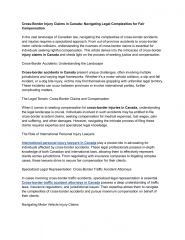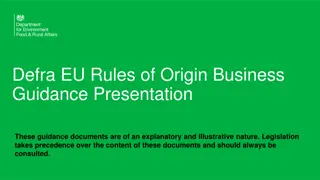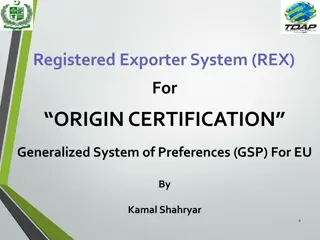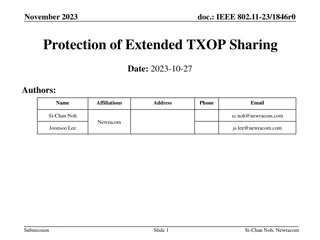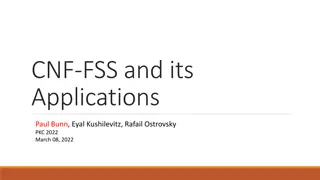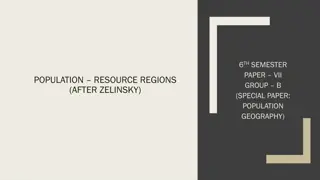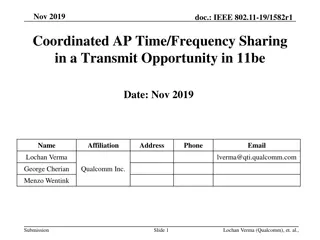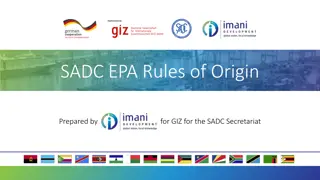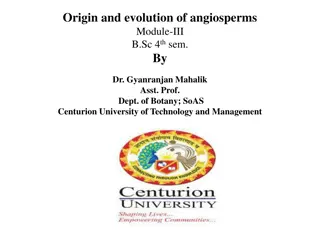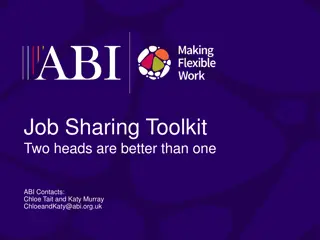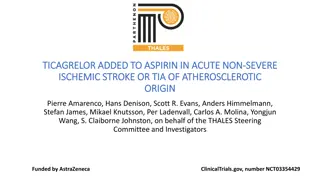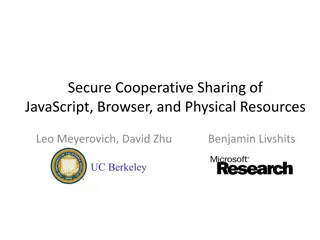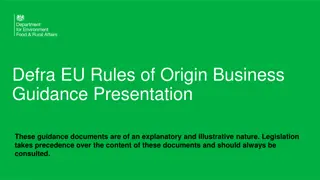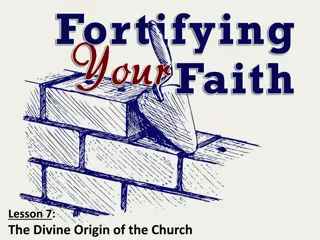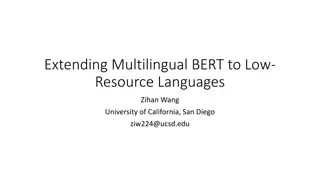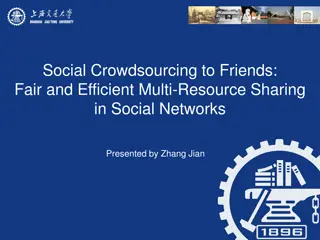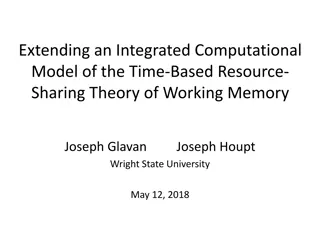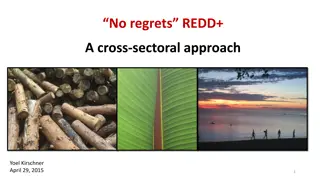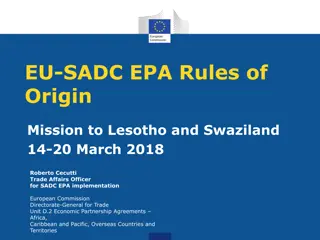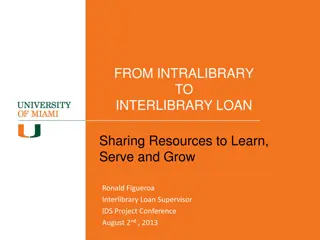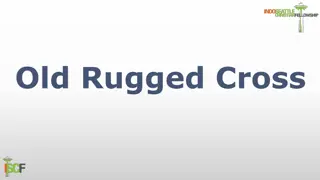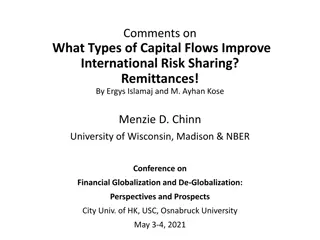Cross-Border Injury Claims in Canada_ Navigating Legal Complexities for Fair Compensation(20_03_2024)
Cross-Border Injury Claims in Canada: Navigating Legal Complexities for Fair Compensation\n\nIn the vast landscape of Canadian law, navigating the complexities of cross-border accidents and injuries requires a specialized approach. From out-of-province accidents to cross-border motor vehicle collisi
0 views • 2 slides
Protecting Your Rights Across Borders_ Expert Legal Assistance for Cross-Border Injuries in Canada(20_03_2024)
Protecting Your Rights Across Borders: Expert Legal Assistance for Cross-Border Injuries in Canada\n\nIn today's interconnected world, accidents don't always adhere to national borders. Whether you're a resident or a visitor, being injured in Canada can present unique legal challenges, especially wh
0 views • 2 slides
NIH Data Management and Sharing Policy Overview
This content provides a detailed overview of the NIH Data Management and Sharing Policy, focusing on the importance of sharing scientific data, the scope of the policy, reasons for data sharing, application of the policy, and differences between Data Management Plans and Resource Sharing Plans. It a
2 views • 25 slides
Efficient Resource Mobilization and Management Strategies by Dr. Abraham Maliet Mamer
This content discusses efficient resource mobilization and management strategies, emphasizing the importance of understanding the typical cycle of resource regime, defining resources, identifying resources, and mobilizing resources effectively. It provides insights into resource allocation methodolo
1 views • 12 slides
Understanding Cross-Connection Control and Backflow Prevention in Water Systems
A cross-connection is a physical link between potable water sources and contaminants, posing health risks. Cross-Connection Control Specialists (CCS) play vital roles in assessing hazards, choosing backflow protection methods, inspecting installations, and maintaining records to safeguard public wat
11 views • 43 slides
The Origin of Viruses: Theories and Evidence
Viruses are acellular parasites with a complex replication mechanism. Studies on their origin present challenges due to the lack of fossils. Three main hypotheses include regressive, cellular origin, and co-evolution. The regressive hypothesis suggests viruses originated from complex ancestors that
2 views • 25 slides
Understanding Rules of Origin and Tariff-Free Trading with the EU
Rules of Origin (RoO) determine the economic nationality of a product, impacting tariffs and restrictions. To trade tariff-free with the EU, compliance with RoO is crucial. Specific rules dictate ingredient sourcing, with certification processes ensuring eligibility for tariff reductions. Certain pr
0 views • 19 slides
Theories on the Origin of State: Divine, Force, Patriarchal, and More
Various theories such as Divine Origin, Force Theory, Patriarchal Theory, and others explain the origin of the state. Divine theories attribute state creation to God, while Force Theory emphasizes the strong subjugating the weak to establish authority. Each theory offers unique perspectives on the h
1 views • 24 slides
Overview of Registered Exporter System (REX) for Origin Certification under Generalized System of Preferences (GSP) for EU
REX is a self-certification system allowing registered exporters to declare the origin of goods. This system simplifies the process by enabling exporters to issue a Statement on Origin (SOO) themselves. Eligible entities in Pakistan can register under REX, ensuring compliance with EU Customs Regulat
0 views • 26 slides
Protection of Extended TXOP Sharing in IEEE 802.11-23/1846r0
Reusing EHT's Triggered TXOP Sharing framework for extended TXOP sharing is discussed in this document, focusing on enabling sharing APs to distribute their obtained TXOP among other BSS(s). The document explores issues related to TXOP sharing for UHR STAs when a sharing AP allocates a portion of it
0 views • 12 slides
Information Sharing Schemes and MARAM for Community Housing Organizations
These slides provide insights on information sharing schemes and the MARAM framework designed for community housing organizations to promote the wellbeing and safety of children, assess family violence risks, and enhance collaboration across service sectors. The Child Information Sharing Scheme (CIS
2 views • 15 slides
CNF-FSS and Its Applications: PKC 2022 March 08
Explore the Background, Applications, and Summary of CNF-FSS, focusing on Function Secret Sharing, Distributed Point Function, CNF Key-Sharing, and more. Learn about the efficiency of multiparty sharing and 1-out-of-3 CNF-FSS constructions for certain classes of functions. Discover how CNF Key-Shari
1 views • 33 slides
Population Resource Regions and Zelinsky's Classification
Geographers have long studied the relationship between population growth and resource adequacy, leading to the concept of Population Resource Regions (PRR) by W. Zelinsky. Zelinsky identified five types of PRR based on population-resource ratios, ranging from Type A with high resource utilization po
0 views • 8 slides
Coordinated AP Time/Frequency Sharing in IEEE 802.11be
The document discusses the concept of Coordinated AP (CAP) Time/Frequency Sharing within a Transmit Opportunity (TXOP) in the IEEE 802.11be standard. It explains the procedures of Frequency and Time resource sharing, highlighting the benefits such as latency improvement and throughput fairness. Deta
0 views • 16 slides
Understanding Country of Origin Determination by U.S. Customs
The country of origin for exports is a crucial aspect in international trade, especially for goods exported to the U.S. This article delves into how U.S. Customs determines the actual country of origin, the implications of origin fraud, and the warning against illegitimate practices. It sheds light
0 views • 18 slides
Technical Soundness of EU-SADC EPA Rules of Origin
The implementation and technical soundness of Rules of Origin under the EU-SADC EPA are crucial for the utilization of trade preferences. Compliance with rules of origin is essential for receiving tariff preferences, but drafting these rules accurately is challenging. Recommendations include specify
4 views • 12 slides
Understanding Market Sharing Cartels in Oligopolistic Markets
Perfect collusion in oligopolistic markets often involves market-sharing cartels, where member firms agree to share the market while allowing some degree of freedom in their decisions. This can be done through non-price competition or quota agreements. Non-price competition cartels involve setting a
8 views • 8 slides
Origin and Evolution of Angiosperms: Insights into Their Phylogenetic Origins
Undisputed fossil records reveal the significant appearance and diversification of angiosperms during the Mesozoic era. The debate on the origin of angiosperms revolves around their monophyletic versus polyphyletic nature. While some argue for a monophyletic origin based on shared characteristics, o
1 views • 5 slides
Enhancing Diversity and Productivity Through Job Sharing in the Insurance Sector
Advertising roles as open to flexible working, including job sharing, is crucial for attracting diverse talent and reducing the gender seniority gap in the insurance industry. Job sharing benefits both employees and employers, increasing productivity and well-being. Evidence suggests that job sharin
0 views • 9 slides
Ticagrelor Added to Aspirin in Acute Non-Severe Ischemic Stroke or TIA of Atherosclerotic Origin
Among patients with transient ischemic attack (TIA) or minor ischemic strokes, adding ticagrelor to aspirin has shown superior efficacy in preventing stroke or death, particularly in those with ipsilateral atherosclerotic stenosis. The THALES trial demonstrated that ticagrelor added to aspirin was m
0 views • 14 slides
Exploring Secure Cooperative Sharing of Resources in Web Applications
This series of visual representations delves into the concept of secure cooperative sharing of JavaScript, browser capabilities, and physical resources in web applications. The images and descriptions cover topics such as web application security, browser functionality, and the principles of sharing
0 views • 22 slides
Understanding Web Security: Cross-Origin Resource Sharing & Same-Origin Policy
Exploring the concepts of Cross-Origin Resource Sharing (CORS) and Same-Origin Policy (SOP) in web security, including their implications on data sharing between different origins and how browsers enforce security restrictions to prevent unauthorized access.
0 views • 22 slides
Understanding the Seal of Origin Program in Chile
The Seal of Origin Program in Chile aims to add value to traditional products by emphasizing their specific geographical origins and unique qualities. It includes seals, geographical indications, appellations of origin, and certification marks to highlight the authenticity and standards of products.
0 views • 31 slides
Red Cross Shelter Partnership Initiative in Missouri
The Red Cross supports a Faith-Based Organization (FBO) Initiative in Missouri, inviting organizations to assist primarily in sheltering efforts for disaster response in the community. The National Shelter System shows numerous Red Cross shelters in Missouri, with advantages to partnering with the R
0 views • 16 slides
Understanding Rules of Origin in EU-UK Trade
Rules of Origin (RoO) are essential in determining the economic nationality of products for tariff classification in EU-UK trade. Compliance with RoO is necessary for accessing preferential tariff rates under free trade agreements. This guidance outlines the principles, conditions, and requirements
0 views • 19 slides
Understanding Cross-Domain Policies in Web Application Security
This content explores various aspects of cross-domain policies in web applications, including the Same-Origin Policy for JavaScript and Flash, their importance in protecting user data, potential risks of bypassing these policies, and the implications of trusting Flash content to read data from exter
0 views • 64 slides
The Divine Origin of the Church: Unveiling Biblical Prophecies
Understanding the divine origin of the church is essential for grasping its significance. This lesson delves into the timeless purpose and prophetic foundations of the church, emphasizing its establishment according to God's eternal plan as foretold in the Old Testament by prophets like Daniel and I
0 views • 12 slides
Extending Multilingual BERT to Low-Resource Languages
This study focuses on extending Multilingual BERT to low-resource languages through cross-lingual zero-shot transfer. It addresses the challenges of limited annotations and the absence of language models for low-resource languages. By proposing methods for knowledge transfer and vocabulary accommoda
0 views • 21 slides
Understanding the Law of Torts: Origin, Theories, and Objectives
Exploring the origin, theories, definition, objectives, history, and development of the law of torts. From the French origin of the word "tort" to the primary objectives of providing relief, imposing liability, and deterring harmful acts, this branch of law plays a crucial role in addressing civil w
0 views • 15 slides
Fair and Efficient Multi-Resource Sharing in Social Networks
This paper explores the concept of fair and efficient multi-resource sharing in social networks, presenting a credit market-based framework for charge-free computing resource sharing. It addresses the challenges of escalating data volumes and the need for collaborative resource allocation strategies
0 views • 21 slides
Understanding Time-Based Resource Sharing Theory in Working Memory
This study delves into the integrated computational model of the Time-Based Resource-Sharing Theory of Working Memory. It focuses on the active mechanism of Time-Based Resource-Sharing, where attention is directed to a single item for maintenance or processing. The study also explores Cognitive Load
0 views • 40 slides
Enhancing Natural Resource Management Through No-Regrets REDD+: A Cross-Sectoral Perspective
Exploring the concept of no-regrets REDD+ as a proactive approach to natural resource management, this presentation emphasizes the importance of transformational change before carbon financing. It delves into how countries leverage REDD+ for wider resource management goals, showcasing examples from
0 views • 11 slides
Enhancing Information Sharing: DISC and PISA Benefits
DISC (Dorset Information Sharing Charter) and PISA (Personal Information Sharing Agreement) facilitate improved information sharing among healthcare organizations in Dorset. DISC establishes robust principles for managing data flow and promoting best practices in information governance, while PISA t
0 views • 8 slides
Understanding Rules of Origin in Trade Agreements
Rules of origin play a crucial role in determining the national source of a product, certifying its origin, and securing preferential treatment under trade agreements. This includes defining where goods are produced and how they are made, with specific criteria for each case. Preferential rules of o
0 views • 15 slides
Enhancing Resource Sharing in Libraries
Resource sharing plays a crucial role in the library environment, fostering collaboration and enabling better service provision to patrons. This presentation delves into the significance of sharing resources, in-house cooperation, and best practices. It also highlights the University of Miami Librar
0 views • 38 slides
Understanding Web Security: Same-Origin Policy in Web Applications
In web development, the Same-Origin Policy plays a crucial role in ensuring the security of web applications by restricting how documents or scripts loaded from one origin can interact with resources from another origin. This policy helps prevent malicious attacks such as Cross-Origin Request Forger
0 views • 25 slides
Cherishing the Old Rugged Cross
On a hill far away stood an old rugged cross, a symbol of suffering and love. The cherished cross, despised by the world, holds a wondrous attraction for those who believe. Stained with divine blood, it symbolizes forgiveness and sanctification. The lyrics beautifully express the deep connection to
0 views • 9 slides
Understanding Pyrexia of Unknown Origin: Causes and Classification
Pyrexia of unknown origin (PUO) is a challenging diagnostic scenario characterized by persistent fever without an identified cause. Dr. Sujeetha Chandrababu M.D. defined PUO as temperatures exceeding 38.3°C for several weeks with no definitive diagnosis. Classification of PUO includes various categ
0 views • 43 slides
Ministry Sharing Information Session Overview
Explore the benefits and options of Ministry Sharing, a collaborative approach for sharing resources and personnel among congregations. Discover how Ministry Sharing can enhance affordability, stability, and the range of resources available for pastoral care, sacraments, and meetings. Consider vario
0 views • 17 slides
Impact of Remittances on International Risk Sharing
Higher remittances in Emerging Market/Developing Economies (EMDEs) between 1990-2018 positively impact risk sharing between consumption and income growth, unlike other types of capital flows. Remittances contribute significantly to enhancing risk-sharing effects, offering about 15% of risk sharing i
0 views • 12 slides
